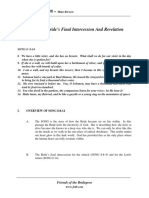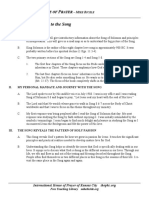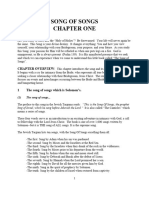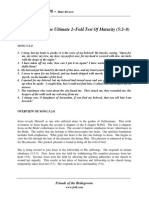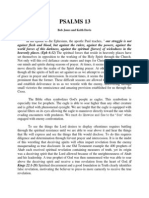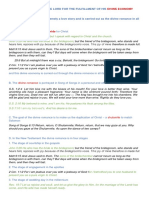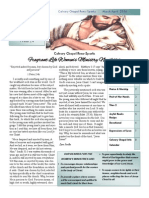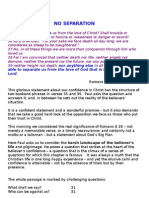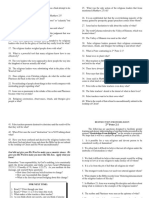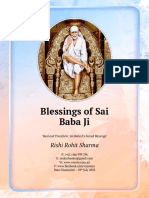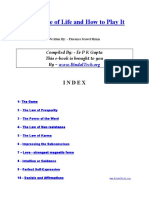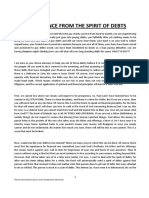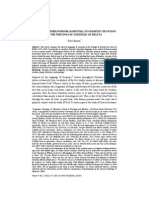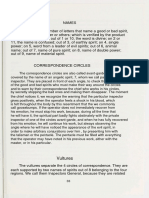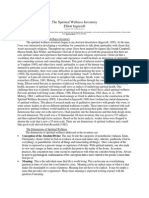Mature Love's Bridal Seal
Uploaded by
eliastemer6528Mature Love's Bridal Seal
Uploaded by
eliastemer6528SONG OF SONGS ‘98 – MIKE BICKLE
SESSION 19: The Bridal Seal Of Mature Love (8:5–7)
SONG 8:5-7
5. Who is this coming up from the wilderness, leaning upon her Beloved? I awakened you
under the apple tree. There your mother brought you forth; there she who bore you
brought you forth.
6. Set Me as a seal upon your heart, as a seal upon your arm; for love is as strong as death,
jealousy as cruel as the grave; its flames are flames of fire, a most vehement flame.
7. Many waters cannot quench love, nor can the floods drown it. If a man would give for
love all the wealth of his house, it would be utterly despised.
I. OVERVIEW OF SONG 8:5-7
A. The Holy Spirit is preparing a bride that has a loving and leaning heart. This is
one of the key truths of the SONG, and the main purpose of her journey, which
culminates in these three verses. She comes forth leaning and loving at the end of
history.
B. The Holy Spirit’s prophetic declaration of the Bride's victory (8:5a,b). Jesus
reminds her of her past journey (8:5c,d,e), then manifests Himself as our bridal
seal (8:6a). Jesus is the divine source (8:6e,f) and the great reward (8:7c,d,e) of
the bridal seal.
Verse By Verse Study of SONG 8:5–7
II. THE HOLY SPIRIT’S PROPHETIC DECLARATION
WHO IS THIS coming up from the wilderness? Leaning upon her Beloved? (8:5)
A. The Holy Spirit gives a prophetic proclamation of the Bride’s final victory.
1. As the Holy Spirit looks over human history, He asks the rhetorical
question: “Who is this who has persevered through tribulation unto a
mature Bride?”
2. The Holy Spirit knows how she persevered through trials and tribulation
during each season of the progression of holy passion.
3. He is prophesying her inevitable victory. He can see a mature Bride at the
end of history.
Friends of the Bridegroom
www,fotb.com
SONG OF SONGS’98 – MIKE BICKLE
SESSION 19 – The Bridal Seal Of Mature Love SONG 8:5-7 Page 2
B. Enduring the pressures of a fallen world.
Who is this coming up FROM THE WILDERNESS? Leaning upon her
Beloved? (8:5)
1. The wilderness, in a personal sense, speaks of our testing, temptations and
difficulties in this life as God trains us in righteousness.
2. The wilderness, in a general sense, speaks of the fallen world that is filled
with sinful human beings and under the influence of Satan.
C. The Bride's victory over all obstacles.
WHO IS THIS COMING UP from the wilderness? Leaning upon her Beloved?
(8:5)
1. The Lord sees the people of God come up in victory through the
wilderness. She comes up. She is not descending, rather she is ascending.
She did not quit in the wilderness.
a. “Coming up” speaks of her victory in the midst of testing, temptations
and difficulties that purified her in this life.
b. “Coming up” also speaks of ascending at the Second Coming or in the
resurrection from this fallen world to enter the eternal city.
2. In SONG 2:8-10, the Bride was urged by Jesus to rise up to go with Him
to the mountains. In fear she refused, and experienced purification in the
following chapters. She now ascends in full love and victory, joyfully
meeting her Beloved on the mountain of spices (SONG 8:14).
Make haste, my Beloved…on the mountains of spices. (SONG 8:14)
3. In SONG 3:6 the Holy Spirit asked this same question, “Who is this
coming up from the wilderness?” He was describing the Lord Jesus
coming up after the cross and in the resurrection from the wilderness of
this fallen world as He ascended to the right hand of the Father. Now in
SONG 8:5 the Bride comes up from the wilderness in His embrace
(SONG 8:4).
Friends of the Bridegroom
www.fotb.com
SONG OF SONGS’98 – MIKE BICKLE
SESSION 19 – The Bridal Seal Of Mature Love SONG 8:5-7 Page 3
D. The Bride is motivated and empowered by love and gratitude.
Who is this coming up from the wilderness? Leaning upon HER BELOVED?
(8:5)
1. Jesus is the “lover of her soul,” her Beloved. The ascending Bride so
loves Him. She calls Him Beloved as she leans on Him. She comes up
victorious in love.
I saw…a sea of glass mingled with fire, and those who have the victory
over the beast…standing on the sea of glass, having harps of God. (Rev.
15:2)
2. Divine love revealed and imparted is the only way that we will not quit in
the wilderness.
a. Anybody can quit except a person in love.
b. When we are tempted to quit, the big obstacle in our path is that we
really love God. Her gratitude and love for Jesus is the motivation
behind her diligent life of obedience not religious motivation of
shame, fear and guilt.
E. She fully embraces weakness as she acknowledges Jesus as her only life goal and
life source.
Who is this coming up from the wilderness? LEANING UPON her beloved?
(8:5)
1. This speaks of apostolic weakness that Paul embraced. This is a voluntary
weakness, which is a rare and yet essential dynamic of spiritual maturity.
And lest I should be exalted above measure by the abundance of the
revelations, a thorn in the flesh was given to me, a messenger of Satan
to buffet me, lest I be exalted above measure. Concerning this thing I
pleaded with the Lord three times that it might depart from me. And He
said to me, "My grace is sufficient for you, FOR MY STRENGTH IS
MADE PERFECT IN WEAKNESS." THEREFORE MOST GLADLY I
WILL RATHER BOAST IN MY INFIRMITIES, THAT THE POWER
OF CHRIST MAY REST UPON ME. (2 Cor. 12:7-9)
Friends of the Bridegroom
www.fotb.com
SONG OF SONGS’98 – MIKE BICKLE
SESSION 19 – The Bridal Seal Of Mature Love SONG 8:5-7 Page 4
2. She is leaning as one who is fully dependent on Him. He Himself is now
her life goal and her source of supply. She is saying, “You are the Reason
I live and You are the Source from which I live.”
3. She is resting in the Lord’s embraced (SONG 8:3) as she embraces
voluntary weaknesses.
F. John the apostle leaned on Jesus’ breast as a prophetic picture of the church
fulfilling SONG 8:5.
Now there was leaning on Jesus' bosom one of His disciples, whom Jesus loved.
(Jn.13:23)
1. Mary of Bethany poured her life out in love for Jesus and is a picture of a
woman in the New Testament leaning and loving Jesus.
2. The Holy Spirit has prepared a bride with a loving and a leaning heart.
This is one of the key truths of the whole SONG.
3. She has an experience likened unto Jacob. She has wrestled and is now
limping. She is leaning, limping, and loving. Our trouble increases when
our agenda and His agenda are different. Our agenda is to be happy on the
earth and His agenda is that we would come up leaning on the One we
love with a heart of love.
4. The Lord’s strategy is to produce in her an attitude of total dependenc y on
Him (Jer. 9:23; 1Cor. 1:31). Paul said that he has no confidence in his
flesh, but he glories in Christ Jesus (Phil. 3:3). Paul spoke of leaning upon
Jesus alone for wisdom, for provision and for sanctifying influences etc.
(1 Cor. 1:30).
5. The Lord promises His Son a Bride with a leaning heart of loyal love that
does not stray in seasons of prosperity or adversity.
a. The history of God’s people reveals that we don’t often lean and love
in the midst of blessing. Eventually, we stand in our own strength,
becoming our own source. We often use the blessing of God to further
our own ends.
b. The heart of fallen man is not prone to lean. Our hearts are prone to
self-assertion and a spirit of independence.
Friends of the Bridegroom
www.fotb.com
SONG OF SONGS’98 – MIKE BICKLE
SESSION 19 – The Bridal Seal Of Mature Love SONG 8:5-7 Page 5
6. All through history when God prospers a people, they often end up not
leaning or loving at the end of the journey.
a. A fact of redemptive history is that many that start out anointed end up
snared in sin and pride. The kings of Israel did not lean upon the Lord
in the seasons of blessing. This is what distinguished king David.
They ended up drunk with power.
b. In the history of revivals, the anointed person starts off crying out for
God's blessing and holiness. Then when the blessing of God rested on
them, they eventually become intoxicated with the ir importance. They
begin to falsely think that the Lord needed them because so many
thousands were responding to them. They think they are indispensable
to God's Kingdom. The most common problem in the history of
revival is that the main leaders became carnal when they prosper.
Often such leaders lose their sense of dependency.
c. The Lord wants to anoint His people in a way that leads them to lean
and love even in times of blessing
G. She has a deep revelation of her inadequacies and weaknesses. The Holy Spirit
has revealed these to her in a way that has created a dependency in her heart.
1. In the wilderness season of testing the Lord revealed her pride to her. He
revealed to her the weakness of her flesh. Walking in the knowledge of
our weakness is a great sign of maturity. I’m not referring to morbid
introspection.
2. She comes up with an understanding of who she is in the flesh, as well as,
who she is in the Holy Spirit. Her first confession in SONG 1:5 was “I
am dark, but lovely.” She has come to mature understanding in both
issues. She holds them in proper balance.
3. Even at the end of his life, Paul the apostle said, “, I am a chief sinner.”
This does not mean that he sinned more than others. Paul meant that he
had more revelation of his sin than anybody around him.
Friends of the Bridegroom
www.fotb.com
SONG OF SONGS’98 – MIKE BICKLE
SESSION 19 – The Bridal Seal Of Mature Love SONG 8:5-7 Page 6
H. Ways that we lean upon Jesus—
1. For salvation- she trusted in His work on the cross, not in her own deeds.
2. For attaining victory - leaning involves looking to her present tense
relationship with the Holy Spirit as her source of power. She does not
trust her discipline, nor in her religious rules. Neither does she look to her
past victories, or her past defeats.
a. She won’t trust in her own rules or religious regulations. What she
trusts in is the active present tense fellowship with the Holy Spirit.
That is the source of her power.
b. She leans on Him in humility. This leaning involves the reaching of
our heart to the person of the Holy Spirit. There is no self-sufficiency,
no trust placed in her own heart. She won’t even lean on her past
victories. She has a deep revelation of her own inadequacy and
sinfulness. She does not trust her discipline.
3. For wholeness - She has laid down the self-protecting behavior that
“shields” her heart from risks and conflicts. She depends upon Him with
genuine vulnerability. He is working in our lives to bring us to a
discovery of our own inadequacies.
4. For direction - in God’s plan the ordering of our steps takes divine
intervention to help circumstances line up correctly. She understands that
she does not have the wisdom or power to arrange her own life. It takes a
sovereign King who has all knowledge of the future and power over all
circumstances. She is no longer leaning upon her own understanding
(Prov. 3:5).
5. For provision - the Lord arranges circumstances in a way that He alone is
seen as her source of supply. She has the confidence to take a nap in the
boat in the midst of a storm, because she has confidence in the provision
of God.
Friends of the Bridegroom
www.fotb.com
SONG OF SONGS’98 – MIKE BICKLE
SESSION 19 – The Bridal Seal Of Mature Love SONG 8:5-7 Page 7
III. VOLUNTARY APOSTOLIC WEAKNESS
A. Jesus wants a Bride who voluntarily remains in weakness as she feels the power
of the Holy Spirit on her. This is how Jesus walked while on the earth.
1. She voluntarily chooses to submit her strengths or resources to the Holy
Spirit in weakness rather then use them to establish her in strength in
natural things.
2. Voluntary weakness – to consciously submit to a place of weakness out of
conviction before God.
a. For example the fasted lifestyle is voluntarily submitting to weakness.
b. We can refuse this type of weakness because of self will, pride etc
3. Mandatory weakness – trials and pressures that come upon us that we do
not choose. Rather, we typically use of our resources to be delivered from
this type of weakness.
B. She sees her strengths as that which can hinder her in her deep life in the Holy
Spirit unless they are consciously submitted to Him.
C. This speaks of apostolic weakness that Paul embraced. This is a voluntary
weakness, which is a rare yet essential dynamic of spiritual maturity.
And lest I should be exalted above measure by the abundance of the revelations,
a thorn in the flesh was given to me, a messenger of Satan to buffet me, lest I be
exalted above measure. Concerning this thing I pleaded with the Lord three
times that it might depart from me. And He said to me, "My grace is sufficient
for you, FOR MY STRENGTH IS MADE PERFECT IN WEAKNESS."
THEREFORE MOST GLADLY I WILL RATHER BOAST IN MY
INFIRMITIES, THAT THE POWER OF CHRIST MAY REST UPON ME. (2
Cor. 12:7-9)
Friends of the Bridegroom
www.fotb.com
SONG OF SONGS’98 – MIKE BICKLE
SESSION 19 – The Bridal Seal Of Mature Love SONG 8:5-7 Page 8
D. She voluntarily embraces weakness in the way she uses her spiritual influence
with people who desire to receive from her.
1. She refuses to take advantage of those who will do anything for her.
2. She refuses to direct people using her spiritual authority.
E. She voluntarily embraces weakness in the way she uses her spiritual influence
with people who resist and oppose her.
1. She does not use her position of power and influence to battle her enemies.
2. She does not use anger and strife to pay back those who oppose her.
F. She voluntarily embraces weakness in the way she operates in her ministry.
1. She refuses to manipulate in ministry contexts
a. Hype
b. Pretense
2. She refuses fleshly exhibition in her ministry style.
a. Showmanship and theatrics
b. She is modest in her ministry style
G. She voluntarily embraces weakness in the way she spend s her money.
1. She continues in her convict to minister to the poor even as abundant
finances are available as a result of the anointing on her life.
2. She continues in the fasted life style in the midst of economic prosperity
on her ministry.
Friends of the Bridegroom
www.fotb.com
SONG OF SONGS’98 – MIKE BICKLE
SESSION 19 – The Bridal Seal Of Mature Love SONG 8:5-7 Page 9
IV. JESUS REMINDS HER OF HER PAST JOURNEY
I awakened you under the apple tree, there your mother brought you forth; there she
who bore you brought you forth.
A. The Lord awakens us and then we respond in obedience.
“I awakened you under the apple tree” (8:5c)
1. “Under the apple tree” – The apple tree is the place of refreshment. The
refreshment of the apple tree is where she received a life-changing
revelation of His love (2:3).
2. Jesus is reminding her of her beginnings in the refreshment of God’s
grace. When she had no thoughts of God, God awakened her heart by
refreshing her with His kindness. He is bringing her back to her
beginning.
3. “I awakened you” – The Lord is responsible for sovereignly initiating all
the spiritual progress in the Body of Christ. He reminds her that He
awakened her at the very beginning when she was initially born-again
under the apple tree. Jesus accomplishes this when He knocks on the door
of a compromising, Laodicean church to awaken it to holy passion (Rev.
3:20). It is the power of His knock that awakens the church and the door is
opened.
B. God is the author of our natural and spiritual birth.
“There your mother brought you forth, there she who bore you brought you
forth” (8:5d,e)
1. “Your mother” – the church is the mother from SONG 3:11. However,
the agency He uses for our natural birth is a woman, i.e. our mother. The
agency He uses for our spiritual birth is a member of the Body of Christ,
i.e. the church. God is our father and the church is spoken of as our
mother. Paul spoke of the New Jerusalem (the church in the eternal city)
as our “Mother” (Gal. 4:26).
a. She speaks of the impact that her mother, or the church, had upon her
in the plan of God.
Friends of the Bridegroom
www.fotb.com
SONG OF SONGS’98 – MIKE BICKLE
SESSION 19 – The Bridal Seal Of Mature Love SONG 8:5-7 Page 10
b. The church effectively brought her forth. During the times of crisis
she wanted to leave her involvement in the body of Christ. At key
times He always directed her, and even mandated her to find herself in
the midst of the people of God. At the very end the Lord says to her,
“Didn’t I tell you the truth? You thought it would be easier on the
outside, but I caused you to have to face issues and I brought you forth
in the context of the people of God.”
2. “Brought you forth” - The church ministered to her effectively, bringing
her into the refreshing love of God’s grace. She led Jesus into the house
of her mother (8:2).
3. “She who bore you” - Jesus reminds her of her spiritual lineage. We owe
much to the church through history that labored to bring us forth. He
wants us grateful to our spiritual roots, instead of despising them. He also
wants us to acknowledge the whole church that contributed to our progress
today and not just to those who believe just like us.
4. “Brought you forth” – the statement is repeated twice in this verse for
emphasis.
5. “There” - Where? From under the apple tree, the revelation of the
affections of God.
V. JESUS IS OUR BRIDAL SEAL
Set Me as a seal upon your heart, as a seal upon your arm; for love is as strong as
death, jealousy as cruel as the grave; its flames are flames of fire, a most vehement
flame. Many waters cannot quench love, nor can the floods drown it. If a man would
give for love all the wealth of his house, it would be utterly despised. (SONG 8:6-7)
A. Jesus invites her to set Him as a seal on her heart.
SET ME as a seal upon your heart, as a seal upon your arm. (SONG 8:6)
1. Jesus is the bridal seal. Jesus is extending an invitation to her to take Him
as the seal on her heart.
2. Her journey started with a longing for His kisses (1:2) and ends with a seal
of love upon her heart. It starts with a longing; it ends with an impartation
of divine love upon her heart.
Friends of the Bridegroom
www.fotb.com
SONG OF SONGS’98 – MIKE BICKLE
SESSION 19 – The Bridal Seal Of Mature Love SONG 8:5-7 Page 11
3. Some Bible notes indicate that the Bride is talking, and others indicate that
the Lord is talking. The Lord Jesus is inviting the Bride to set Him as a
seal upon her heart.
a. It is not reasonable for the Bride to ask the Lord to set her on His
heart. That is completely out of the flow of everything happening
here.
b. It is unreasonable that she would plead with the Lord to love her after
all He has spoken to her throughout the entire book. He does not need
to be urged to love her. She has been on His heart from eternity.
B. In the ancient world a royal seal authenticated royal documents such as title deeds
and military strategies.
Set Me AS A SEAL upon your heart, AS A SEAL upon your arm. (SONG 8:6)
1. It was a wax Seal. A title deed was a royal document sent from one king
to another. This wax seal covered the entire document and then the king
used his signet ring to seal the document. It was like a personal signature
because a king’s seal was distinguished one from another, so that the king
receiving the document could know that it came from the Caesar.
a. This wax seal spoke of the king’s ownership, protection and authority.
b. It distinguished a king from another king much like a signature does
today.
2. The king’s army fully protected the king’s seal. A king’s Seal was sacred.
It spoke of his word or his guarantee, and was backed up by all the power
and might of that king. This seal spoke of the king’s ownership, his
protection and his authority. Even if a Roman senator, someone in the
king’s court, opened that seal, that document and broke that seal, he would
do so at the cost of his life. The king’s army fully backed up the king’s
seal.
a. Breaking a royal seal was a serious crime leading to the death penalty.
If even a government official broke the royal seal without the king’s
permission, he would be put to death.
Friends of the Bridegroom
www.fotb.com
SONG OF SONGS’98 – MIKE BICKLE
SESSION 19 – The Bridal Seal Of Mature Love SONG 8:5-7 Page 12
b. The army of the king backed up the seal. A hundred soldiers were
sometimes used to transport a sealed document from one nation to
another. If the Seal was broken, all hundred soldiers were executed.
c. The entire army stood behind the king’s Seal. The power of the whole
empire would be behind the king’s Seal.
d. The seal protected the contents of the document. When the king put
his seal on it, it was protected; it spoke of his ownership and his
authority. It spoke of the king’s ownership, protection and his
authority.
3. The Divine guarantee is behind His seal. Seal speaks of a king’s
guarantee. God is putting a Seal on the heart of His people. He protects
and guarantees what is in the Seal.
VI. THE DIVINE SOURCE OF THE BRIDAL SEAL
A. It is a Seal of fire that He puts on the hearts of His people.
Set Me as a seal upon your heart…ITS FLAMES ARE FLAMES OF FIRE, a
most vehement flame. Many waters cannot quench love…(SONG 8:6-7)
1. It is a seal made up not of wax but Divine fire. The Seal is none other
than the power of Jesus released by the Holy Spirit, called the “Fire of
God”.
a. God Himself inspires fiery love in the heart of the Bride for Jesus. It is
the sovereign work of the Spirit.
2. This Seal can be referred to as “Sealing love.” It takes God to love God.
God seals our heart with the Seal of Divine love.
3. It is the Father’s love empowering sinful human hearts.
a. It is God loving Jesus through us. It takes God to love God. The
flame of fire has power over all sinful flames. It is a powerful flame
that can dominate even the most powerful perversions when we yield
to it consistently. The source of fiery love is divine
Friends of the Bridegroom
www.fotb.com
SONG OF SONGS’98 – MIKE BICKLE
SESSION 19 – The Bridal Seal Of Mature Love SONG 8:5-7 Page 13
b. Jesus prayed in John 17:26, “Father, the love that You have for Me
would be in them.” The Father will keep His promise to put His love
into people of God for the Lord Jesus.
c. The Holy Spirit will release the very flame of God in the human heart.
We love what He loves most- His church. We are the main dream that
He has (SONG 7:10).
B. The very fire of God
Set Me as a seal upon your heart…its flames are flames of fire, A MOST
VEHEMENT FLAME. Many waters cannot quench love (SONG 8:6-7)
1. The phrase, “the most vehement flame” is often translated as “the very
flame of God” (NAS).
a. The construction of the Hebrew phrase “vehement flame” ends with
the letters “el,” which speaks of God.
b. Whether it is translated as “a most vehement flame” or as “the very
flame of God,” it means the same, because God’s flame is the most
vehement flame.
c. The NIV translates the phrase as “like a mighty flame.” Then it adds
in the margin an alternative translation of the phrase “like the very
flame of the Lord.”
d. The main truth is to understand that it is God’s very fire burning in the
human soul. It is a supernatural flame.
2. “A most vehement flame” - No power can overpower the force of fire,
water, death or the grave. These are the most powerful metaphors of
human life describing the power of the love of God in the conflict of the
human heart against sin. In the same way, this divinely inspired love and
jealously cannot be overpowered by anything in the natural arena.
Friends of the Bridegroom
www.fotb.com
SONG OF SONGS’98 – MIKE BICKLE
SESSION 19 – The Bridal Seal Of Mature Love SONG 8:5-7 Page 14
C. This is the source of the bridal seal.
“Its flames are flames of fire” (8:6e)
1. This fire of love manifests itself by tenderizing our hearts so that we feel
some of what He feels. Our hearts are by nature hard, dull and insensitive
to the things that God feels. There is nothing more precious and pleasant
to us that to be empowered to feel what He feels. It takes God’s help for
us to be able to feel God. The Holy Spirit pours the love of God into the
heart. (Rom. 5:5).
2. “Its flames” - NAS translates the phrase “flames” as “flashes.” God’s fire
flashes in the human heart. A flash of fire comes powerfully, suddenly,
and then soon wanes until the next flash. God’s fire often comes to us in
this way. There are times when He tenderizes us suddenly as a flash of
fire. Then sometimes as suddenly as it comes, it seems to leave. Our
heart waits with great anticipation for the next visit of His flashing
tenderizing fire.
D. One of the first revelations of God in Scripture is God as a consuming fire, a
jealous God (Deut. 4:24).
a. He is not jealous in the carnal way. However, He is an emotional God.
He has fiery emotions. He cares intensely about His people. He is a
jealous, passionate consuming ocean of fiery love.
b. His jealousy does not mean He is mad at everything. People think if
God is jealous, He is mad all the time. His jealousy means He has hot
desire for His people. He is a burning Fire of hot emotion.
E. “Its flames” - The source of this power and impact is the flame of God which
speaks of the Holy Spirit.
1. In Dan. 7:10, when Daniel saw the throne of God, he saw a river of fire
proceeding out of it. That river of fire is a picture of the Holy Spirit.
2. The river of God is a river of living water, but it is also a river of divine
fire imparting passion in the hearts of God’s people for the Son of God.
Friends of the Bridegroom
www.fotb.com
SONG OF SONGS’98 – MIKE BICKLE
SESSION 19 – The Bridal Seal Of Mature Love SONG 8:5-7 Page 15
3. Fire penetrates and pur ifies its object. This speaks of the impartation of
divine love into the hearts of believers by the Holy Spirit. This is the love
of God poured into the heart by the Holy Spirit (Rom. 5:5). Fire
penetrates and purifies its object (Mal. 3: 1-6). This fire does not consume
us; it only consumes the dross.
4. People often think of God’s fire first in terms of judgment. God’s fire is
first an expression of His passionate emotion. Yes, it does destroy that
which hinders love. His fire is first His love. The judgment aspect of
God’s love is that which removes what hinders bridal love. Jesus
F. The fire of God is fascinating!
1. God's Person is described as a consuming fire. The throne of God is
ablaze with fire. There are wheels of fire under the throne.
2. There is a river of fire coming out of the throne.
3. The place that the saints stand to worship is on a sea of glass like crystal
that is mingled with flaming fire Rev. 15:2.
4. The angels possess fire.
5. The atmosphere has fire all around it when Jesus returns. Jesus’ eyes are
filled with fire. When He looks at His Bride He will awaken Divine fire in
her all through eternity.
6. The fire did not consume the bush next to Moses (Ex.3: 2).
Friends of the Bridegroom
www.fotb.com
SONG OF SONGS’98 – MIKE BICKLE
SESSION 19 – The Bridal Seal Of Mature Love SONG 8:5-7 Page 16
VII. JESUS IS THE SEAL
A. This seal is our heavenly King’s seal. It is not the wax seal of an earthly king. It
is a seal of fire by the Holy Spirit.
1. This seal operates as the person of the Holy Spirit releasing the power of
Jesus Christ. The seal is none other than the person of Jesus released by
the Holy Spirit.
2. This seal is not the wax seal of an earthly king, but a supernatural seal of a
heavenly King.
3. The seal is none other than the power of Jesus released by the Holy Spirit.
God Himself inspires fiery love in the heart of the Bride for Jesus.
4. It is the sovereign work of the Holy Spirit. This seal could be referred to
as “sealing love” – it takes God to love God.
B. “Set Me ” - NIV translates the phrase “set Me” as “place Me.” NAS translates it
as “put Me.”
1. David said, “I have set the Lord continually before me” (Ps.16:8 ). Set or
place the Lord on your heart by communing with Him.
2. Open your spirit to Him. Jesus is the sustaining seal that keeps us loyal.
He releases the activity of the Spirit in us.
3. He is inviting us to an active present-tense partnership with the Holy
Spirit. An important part of cooperating with the Holy Spirit is the posture
of soul that is reaching to Him for fellowship.
4. Make time to interact with Him in prayer. Give yourself to Him.
Friends of the Bridegroom
www.fotb.com
SONG OF SONGS’98 – MIKE BICKLE
SESSION 19 – The Bridal Seal Of Mature Love SONG 8:5-7 Page 17
C. There is no other seal besides “Jesus in the present tense.” In other words, the
Holy Spirit touching our hearts in the present tense.
1. He invites us to active present tense partnership with the Holy Spirit.
When He says, “Set Me,” He is saying come into partnership with the
Holy Spirit, fellowship with the Holy Spirit, or intimacy with Jesus.
2. The important part of cooperating with the Holy Spirit is the posture of
soul that is reaching to Jesus for fellowship.
a. Make time to interact with Him.
b. The prayer and fasting is not the Seal rather, it is Jesus touching our
heart in the present tense.
c. However, spiritual disciplines do increase our capacity to receive and
to become tenderized. The power of God changes us, not these
disciplines.
d. The power that actually tenderizes us is the power of God, not the
spiritual disciplines. They do make us more receptive to receive more
easily. However, these spiritual disciplines do not earn us the power
of God.
e. They spiritual activities merely put us in a position to freely receive
the tenderizing impact of the Holy Spirit in a greater way. Therefore,
fasting and prayer do not earn us anything. They do increases our
capacity to receive.
f. Some people think that there is something magical about spiritual
disciplines. It is the Spirit that has power not the disciplines.
D. The seal speaks of the way that we carry our heart, or the way we identify and
define our life. In other words, how we determine our spiritual identity
1. Our past victories are not the seal. The seal is fellowship with Jesus in the
Holy Spirit.
Friends of the Bridegroom
www.fotb.com
SONG OF SONGS’98 – MIKE BICKLE
SESSION 19 – The Bridal Seal Of Mature Love SONG 8:5-7 Page 18
2. There is no other seal besides Jesus. “Jesus in the present tense.” It is
Jesus today that keeps our heart protected. The seal is not primarily our
past experiences with Him. It is communing with Him in the present tense
that causes the authority of God to protect us from the warfare that is at
each side.
3. The Seal on your heart is not our past record of failure. It is not your
record of mistakes and sins.
4. To some their seal is their future promises. Some people define their life
by their future expectations.
a. They have such strong expectation of being anointed or of having
certain type of natural circumstances.
b. These people live too much in the desire for future promises to be
released on their earthly lives. Therefore, they become very
vulnerable to disappointment because the future never seems to turn
out as they expect.
VIII. THIS SEAL OF FIRE IS A PROGRESSIVE SEALING
A. The Holy Spirit seals us the day we are born again. This seal includes the
manifestation of the presence of God on our hearts that causes us to grow in love
over the years.
1. It is the wedding ring; it is the earnest payment. At the new birth we are
engaged officially to the Lord.
2. God wants to progressively cause our hearts to be sealed with His
presence to come forth in love in a greater way.
3. I believe the Holy Spirit first marks the believer for God and then the
antichrist marks the rest of humanity that refuses the Holy Spirit (Ezk.
9:6).
Friends of the Bridegroom
www.fotb.com
SONG OF SONGS’98 – MIKE BICKLE
SESSION 19 – The Bridal Seal Of Mature Love SONG 8:5-7 Page 19
IX. JESUS’ INVITATION: THE 2-FOLD BRIDAL SEAL
Set Me as a seal UPON YOUR HEART, as a seal UPON YOUR ARM; for love is as
strong as death. (SONG 8:6)
A. He first says, “Set Me as a seal upon your heart,” then second He says, “Set me as
a seal upon your arm,” Both of the 2 great commandments are spoken of here.
B. The arm speaks of our work and the heart speaks of our affection.
1. The seal of love on the heart speaks of her affections as she lives out the
first commandment; “You shall love the Lord God with your whole
heart.”
2. The seal of love upon the arm, (our ministry), speaks of her labors in
ministry as she lives out the second commandment, “You shall love your
neighbor as yourself.”
3. God is imparting love to her heart unto intimacy with God and community
with people. This seal fulfills both elements of her original prayer in
SONG 1:4 - to be “drawn” into intimacy and to “run” unto community.
C. The sealed heart speaks of her affections and emotions being impacted by the
power of God
“As a seal upon your heart”
1. The seal of love on the heart speaks of the first commandment -
wholehearted love for God.
2. Jesus Himself wants to be the protection of our heart from backsliding,
sin, bitterness, fear, and slander. He wants to protect us from fear.
Friends of the Bridegroom
www.fotb.com
SONG OF SONGS’98 – MIKE BICKLE
SESSION 19 – The Bridal Seal Of Mature Love SONG 8:5-7 Page 20
D. The sealed arm speaks her labors in ministry being anointed by the power of God
“As a seal upon your arm”
1. The seal of love upon the arm speaks of the second commandment,
wholehearted love for people.
2. The seal upon the arm speaks of the ability to impart this passion for God
to others through our labors. In our counseling or deliverance, or
evangelism or Bible studies, we want to lead people to become lovers of
God. We want our arms sealed. We want our labors in ministry to inspire
love.
3. The sealed arm speaks of the sanctified acts of believers instead of the arm
of the flesh. This speaks of Holy Spirit inspired activities. All of her
activities are focused and limited to doing the will of God while refusing
every ministry idea and opportunity that does not flow from the Holy
Spirit.
a. This speaks of the discernment and willingness to say no to the arm of
the flesh activities.
b. We want an arm that is sealed in the love of God. It means that we
don’t just go through the mechanics of ministry but we actually
imparting this Seal to others in through our arm of ministry.
E. The Seal on the arm is more than imparting passion. He wants to protect us in our
labors so that we don’t burn out. So that we don’t end up quitting because of pain
or shame. It is so much more difficult to keep our passion fresh and alive in the
midst of ministry. The Seal of love on our arm is also protection from
compromise and defilement in our ministry. It is easy to become defiled in the
midst of laboring. It is easy to become bitter as people lack gratitude after we
serve them. Jesus desires that this holy passion protect her from compromise and
defilement as she serves other people.
F. She wants to be drawn into intimacy (1:4), and she wants to run with Him in
ministry. The two commandments - the heart and the arm including intimacy and
impact. In other words, being a worshiper and yet being a help to people
Friends of the Bridegroom
www.fotb.com
SONG OF SONGS’98 – MIKE BICKLE
SESSION 19 – The Bridal Seal Of Mature Love SONG 8:5-7 Page 21
X. THE COMPREHENSIVE NATURE OF THE BRIDAL SEAL
A. He describes the nature of the seal of love as being as strong as death.
Set Me as a seal upon your heart…FOR LOVE IS AS STRONG AS DEATH,
jealousy as cruel as the grave; its flames are flames of fire… (SONG 8:6-7)
1. How strong is death? How comprehensive is death? Death claims every
living thing in the natural order of things. Nothing escapes it. He will
manifest to us a love that is as comprehensive as death and the grave. This
is the meaning of these metaphors.
2. In other words, the nature of this imparted love is comprehensive, nothing
created can overpower it. Just as death consumes everything so also
nothing will escape the grasp of the God's love that He will give to us.
3. The Holy Spirit in the New Covenant as an indestructible life.
…but according to the power of an indestructible life. Heb 7:16
(NAS)
a. Anger is destructible. Lust is destructible. Demonic bondages are
destructible. Yet, God's Spirit, when yielded to is indestructible. It
can overpower every single human bondage when we consistently
fellowship with the Holy Spirit.
b. The New King James translates it as an “unending life” emphasizing
its duration in terms of time instead of power. I believe this passage is
describing power whereas it is unending in power.
…but according to the power of an endless life Heb 7:16.(NKJ)
4. The seal of love that is like the grave is a seal that is all prevailing, all
comprehensive, all powerful. In other words, no area in our life is outside
the scope of the power of this redeeming transforming Divine love.
5. The seed of this divine love is planted in our heart at the new birth. It will
grow as we cultivate it. There is an act of our will. There is an active
cooperation with Him. There is no bitterness, sexual sin, covetousness or
demon stronger than this comprehensive, all-encompassing love of God to
those who will continue to say "Yes!” to it. We say yes to God's love with
boldness in your spirit, knowing who you are in Christ as a worshipper.
Friends of the Bridegroom
www.fotb.com
SONG OF SONGS’98 – MIKE BICKLE
SESSION 19 – The Bridal Seal Of Mature Love SONG 8:5-7 Page 22
B. A jealous love for God
Set Me as a seal upon your heart…for love is as strong as death, JEALOUSY
AS CRUEL AS THE GRAVE; its flames are flames of fire… (SONG 8:6-7
1. “Jealousy” - Jesus was consumed with this zeal for His Father (Jn. 2:17).
God is jealous for His Son and His people (Deut.4:24). God’s jealousy is
a pure manifestation of His love. It is a divine jealousy for godliness.
a. The spirit of jealousy for God consumed Phinehas and he drove sin out
of the camp (Num.25:1-13).
b. God's own jealousy will be imparted to us by the Holy Spirit. God's
jealousy is as demanding or as cruel and as comprehensive is the
grave.
c. The jealousy of God claims everything in our life if we expose ourself
to it.
2. “As cruel as the grave” - NIV translates “cruel” as “unyielding.” NAS
translates it as “severe.”
a. The grave is cruel or unyielding in that it demands the total submission
of all. No one escapes it. Nothing escapes the severe grasp of the
grave in the natural order of things. Nothing escapes the power of this
holy severe love.
b. It is going to be a divine jealousy imparted by the power of the Holy
Spirit to the human heart. Everything will come under it is grasp, just
like everything comes under the grasp of the grave.
c. NAS translates “grave” as “Sheol.”
C. SUMMARY—He will release a love upon us that is as comprehensive as death
and the grave. This love will include every secret area of life. We long for a
comprehensive love that captures every area of our lives for Jesus. We don’t have
to live in failure.
Friends of the Bridegroom
www.fotb.com
SONG OF SONGS’98 – MIKE BICKLE
SESSION 19 – The Bridal Seal Of Mature Love SONG 8:5-7 Page 23
XI. THE SUPERNATURAL POWER OF THE BRIDAL SEAL
A. Many waters of affliction cannot quench this kind of love, because it is a
supernatural work of God in the heart for the Lord Jesus.
Set Me as a seal upon your heart…its flames are flames of fire, a most
vehement flame. MANY WATERS CANNOT QUENCH LOVE, nor can the
floods drown it. (SONG 8:6-7)
1. “Many waters” - Waters speak of the obstacles and pressures of every day
life that hinder us from receiving this impartation of divine love and holy
jealousy.
2. Water naturally puts fire out. But this is a supernatural fire. It can not be
put out by any water in the natural.
3. There are many different types of waters in Scripture. These are negative
waters that the enemy will use to try to quench Divine love in our soul.
4. There are many diverse waters to quench the fire of God in our hearts. It
cannot quench” the impartation of divine love when we yield to it in our
spirit in a consistent way. Why? Because it is the Father’s love for His
own Son. This passage is not speaks of just about the love of God to us.
It is refers to the love of God imparted in us that we might become mature
lovers of God. The very flame of God Himself is to be the seal upon our
heart. The source of love is God Himself. It has nothing to do with our
personality or temperament. It has nothing to do with whether we have
been abused or if we are addicted to pornography or drugs. It is stronger
than any “sinful flame” in our life.
B. Five types of quenching waters
1. The first types of quenching waters are difficulties that tempt us to be
offended with God because of their severity (Mk. 4:17).
a. He declares that even the negative waters of disappointment like
sickness, failure, cannot quench this flame.
b. We can overcome all of these things tha t would cause our hearts be
quenched by disappointments.
Friends of the Bridegroom
www.fotb.com
SONG OF SONGS’98 – MIKE BICKLE
SESSION 19 – The Bridal Seal Of Mature Love SONG 8:5-7 Page 24
2. The second types of quenching water are the cares of this world and the
deceitfulness of riches (Mk. 4:19).
3. The third type of quenching water is accusation and condemnation from
the enemy as we experience our own failure in sin.
4. The fourth types of quenching waters are temptations. Joseph felt the
waters of temptation when Potiphar’s wife said, “come lie with me.” But
the fire of God was kindled in his heart and that the waters of immorality
couldn’t put it out. There is a fire that keeps us loyal to God in the face of
the sinful pleasures.
5. The fifth types of quenching waters are prosperity. The enemy uses
prosperity and pleasure on one hand and then poverty and shame on the
other to quench the impartation of the love of God.
C. The violent floods of persecution can not put out this Divine fire.
Set Me as a seal upon your heart…its flames are flames of fire, a most
vehement flame. Many waters cannot quench love, NOR CAN THE FLOODS
DROWN IT. (SONG 8:6-7)
1. “The floods” - of persecution. Floods speak of great obstacles that create
great crisis. A flood is not a positive thing. By the natural order of
things, fire is extinguished by water. But not even a violent flooding river
can put out this fire. This is not a natural fire. Nothing can put it out.
2. The waters are one thing, but the floods are an excessive amount of water.
3. “Drown it” - NAS translates as “overflow it.” NIV says, “wash it away.”
Friends of the Bridegroom
www.fotb.com
SONG OF SONGS’98 – MIKE BICKLE
SESSION 19 – The Bridal Seal Of Mature Love SONG 8:5-7 Page 25
4. The enemy will rage like a flood against the end-time church (Rev.12:7-
17). This great persecution has already begun in various places around the
world. This demonic rage against the church will not drown out God’s
love for Jesus in the heart of the Bride.
And war broke out in heaven: Michael and his angels fought with the
dragon; and the dragon and his angels fought, but they did not prevail,
…So the great dragon was cast out…he was cast to the earth, and his
angels were cast out with him…Woe to the inhabitants of the earth and
the sea! For the devil has come down to you, having great wrath,
because he knows that he has a short time." Now when the dragon saw
that he had been cast to the earth, he persecuted…So the serpent spewed
water out of his mouth like a flood after the woman, that he might cause
her to be carried away by the flood…the dragon was enraged with the
woman, and he went to make war with the rest of her offspring, who
keep the commandments of God and have the testimony of Jesus Christ.
(Rev.12:7-17)
XII. THE GREAT REWARD OF THE BRIDAL SEAL
A. As her journey ends, the Lord gives her a proverb concerning unquenchable love.
This proverb speaks of a man who would sacrificially give everything to help one
that he deeply loves.
Set Me as a seal upon your heart…its flames are flames of fire…Many waters
cannot quench love…IF A MAN WOULD GIVE FOR LOVE all the wealth of
his house, it would be utterly despised. (SONG 8:6-7)
1. Wealthy people buy gifts without looking at price tags. When the wealthy
walks into a store, they do not need to look at price tags. One sign of their
wealth is that cost no longer matters.
a. He is talking about “love that has no price tags.”
b. A person in love does not recognize sacrifice
2. The Bride is wealthy in love. She obeys without any regard to cost. Holy
love has no limit to how much it will give. The Holy Spirit is going to
impart wealthy love, which does not care what the price tag is.
Friends of the Bridegroom
www.fotb.com
SONG OF SONGS’98 – MIKE BICKLE
SESSION 19 – The Bridal Seal Of Mature Love SONG 8:5-7 Page 26
B. The Bride's total commitment
Set Me as a seal upon your heart…its flames are flames of fire…Many waters
cannot quench love…If a man would give for love ALL THE WEALTH OF
HIS HOUSE, it would be utterly despised. (8:7c,d,e)
1. The house is more than the specific home one lives in. It speaks of his
family inheritance and all that his family has accumulated over
generations. It speaks of everything that we are in the past, the present,
and the future.
2. Paul the apostle did this very thing.
If anyone else thinks he may have confidence in the flesh, I more so:
circumcised the eighth day, of the stock of Israel, of the tribe of
Benjamin, a Hebrew of the Hebrews; concerning the law, a Pharisee;
(Philippians 3:3-5)
3. He gave up these things that gave him a tremendous future in fleshly
standards.
C. The reward of the Bride of Christ is simply that she has received the power to
wholeheartedly love Jesus.
Set Me as a seal upon your heart…its flames are flames of fire…Many waters
cannot quench love…If a man would give for love all the wealth of his house,
IT WOULD BE UTTERLY DESPISED. (8:7c,d,e)
1. Suddenly Solomon shares this proverb about love.
2. The point is that the love itself is the reward.
Friends of the Bridegroom
www.fotb.com
SONG OF SONGS’98 – MIKE BICKLE
SESSION 19 – The Bridal Seal Of Mature Love SONG 8:5-7 Page 27
3. An illustration of such love could be seen in the parents of a 5-year-old
child that has a terminal sickness. The doctor informs the parents that in
order to see their child healed they will need to sell their expensive home
and empty their sizeable bank account. Everything they have ever saved
and inherited will go towards their child’s medical costs. This young
couple sells all, they empty their bank account, sell their family business,
and nothing of value goes untouched. They go from financially wealthy to
poor overnight, paying the expenses for their child. However, their child
is healed and they are thrilled. Then the neighbor comes to them and says,
“This is incredible what you have done for your little child.” The response
of both parents is; “We utterly despise such recognition, or even the
thought that what we have done is noble”. This depth of love sees no price
tag nor desires recognition. The love itself is the reward!
4. She loves Him with all of her strength by the goodness of God. That is all
that she ever wanted. Her reward is the love itself.
D. Paul gave up many things that gave him a tremendous future in fleshly standards.
He considered them as rubbish when compared in the balance of the man Christ
Jesus.
But what things were gain to me, these I have counted loss for Christ. Yet
indeed I ALSO COUNT ALL THINGS LOSS for the excellence of the
knowledge of Christ Jesus my Lord, for whom I have suffered the loss of all
things, and COUNT THEM AS RUBBISH, that I may gain Christ…that I may
know Him and the power of His resurrection, and the fellowship of His
sufferings, being conformed to His death, (Philippians 3:7-10)
E. Such love despises recognition of being heroic and noble for giving all. The very
love itself is the reward. She would despise the idea of comparing her sacrifices
for Him as equal to His great love for her. She has received from the Spirit the
kind of love that is free from self- awareness and self-congratulation.
F. Jesus taught new believers to count the cost before they make sacrifices. Mature
believers already know that they do not give up anything comparable to what they
first received. They despise recognition for what others call “sacrifice.” They
want no recognition whatsoever because they did it in light of the indescribable
beauty of Christ Jesus. It was for the Son of God who gave Himself.
Friends of the Bridegroom
www.fotb.com
SONG OF SONGS’98 – MIKE BICKLE
SESSION 19 – The Bridal Seal Of Mature Love SONG 8:5-7 Page 28
G. In the beginning of her journey, she prayed for what she desired most. She asked
for the kisses of His mouth (1:2). All she really wanted was the power to love
God fully. Over the years, she received His kisses. Her heart became tenderized.
This is her reward.
XIII. PROPHETIC WORD CONCERNING THE BRIDAL SEAL
(JULY 1988)
A. In July 1988 I had one of the most powerful experiences in my life. I was in my
office one morning, having my usual devotion time. I was reading the Song of
Solomon chapter 8 verses 6 and 7 while praying, “Oh Christ Jesus I set You as the
seal on my heart. I open my spirit to You.” I was asking the Father to keep His
promise to His Son by causing me to love Jesus like He does. I prayed, “Father, I
want to love Your Son like You do. Oh! give me this love” (John 17:26). I was
waiting on the Lord to be strengthened in my love for Jesus according to Jn.17:26.
I was putting Jn. 17:26 together with SONG 8:6-7, and I felt the tenderizing of the
Holy Spirit on me.
B. My heart was being tenderized as I felt the sweetness of God’s Presence. So I
asked the receptionist to hold phone calls for one hour. The tenderizing of the
Spirit increased as I wept before the Lord. I continued, “Lord, I want more of this
love that is stronger than death.”
C. The phone rang in spite of my request to be undisturbed and I was given a life
changing prophetic word.
1. “The Lord told me by His audible voice to give you Song of Solomon 8:6-
7. The Lord also told me to tell you that this is what He is going to release
to the Body of Christ in this generation.” One of Jesus’ worldwide
purposes for this generation is to release to the Body of Christ the Song of
Solomon 8 verses 6 and 7!
2. And he said, “The Lord told me to tell you that this is going to be the main
focus of ministry for the rest of your life.”
Friends of the Bridegroom
www.fotb.com
SONG OF SONGS’98 – MIKE BICKLE
SESSION 19 – The Bridal Seal Of Mature Love SONG 8:5-7 Page 29
3. The Lord has given me permission to pray for people that the Lord is
calling to this same main focus of their ministry. He is raising up people
right now who will call others to wholehearted love for God as their main
ministry focus. As a pastor, I speak on many subjects, but my main focus
of ministry is calling the church to wholehearted love for God (the first
commandment). To various degrees most ministries call people to
wholehearted love. However, God will call some of you, to have this as
your main focus in ministry.
D. God is going to release mature bridal love. It is because of the Father’s promise
to His Son. It is not related to the nature of your temperament etc. This is my
strong hope for weak people like you and me. The Lord is going to empower His
Church with divine love. He wants us to reach to Him in faith for this.
E. Prayer Ministry—Holy Spirit, release two things to the people who read this.
First, put Your seal of love upon their hearts. Recapture the focus of their heart
by renewing this seal (a progressive work of God). Secondly, anoint people to
impart wholehearted love for God as their main ministry focus.
Friends of the Bridegroom
www.fotb.com
You might also like
- Standing Without Offense at The End of The AgeNo ratings yetStanding Without Offense at The End of The Age5 pages
- First Four Chapters Focus On The Bride'SNo ratings yetFirst Four Chapters Focus On The Bride'S42 pages
- I H P Session 1 Introduction To The Song: Nternational Ouse of RayerNo ratings yetI H P Session 1 Introduction To The Song: Nternational Ouse of Rayer5 pages
- The Brides Identity and Life Purpose SOS12No ratings yetThe Brides Identity and Life Purpose SOS127 pages
- The Bridal Paradigm Foundational Truths SOS11No ratings yetThe Bridal Paradigm Foundational Truths SOS116 pages
- Going Out To Meet The Bridegroom: Bringing Love To Our Lenten StruggleNo ratings yetGoing Out To Meet The Bridegroom: Bringing Love To Our Lenten Struggle4 pages
- Living A Life of Loving The Lord For The Fulfillment of His Divine EconomyNo ratings yetLiving A Life of Loving The Lord For The Fulfillment of His Divine Economy4 pages
- Sbs - 099 - EN His-Wife-Hath-Made-Herself-ReadyNo ratings yetSbs - 099 - EN His-Wife-Hath-Made-Herself-Ready4 pages
- Song of Songs: Journeying Into Divine LoveNo ratings yetSong of Songs: Journeying Into Divine Love45 pages
- Calvary Chapel Newsletter March-April 2014No ratings yetCalvary Chapel Newsletter March-April 20148 pages
- International House of Prayer University - Mike BiNo ratings yetInternational House of Prayer University - Mike Bi7 pages
- Larry Huch - The 7 Places Jesus Shed His Blood PDF100% (14)Larry Huch - The 7 Places Jesus Shed His Blood PDF103 pages
- 215 Truths About My Position in Jesus ChristNo ratings yet215 Truths About My Position in Jesus Christ9 pages
- 30 Scripture Verses Regarding The Blood of JesusNo ratings yet30 Scripture Verses Regarding The Blood of Jesus4 pages
- SPIRITUAL LAWS OF SOWING AND REAPING... Nine Principles100% (3)SPIRITUAL LAWS OF SOWING AND REAPING... Nine Principles3 pages
- PWC009 - Destruction From Religion - NotesNo ratings yetPWC009 - Destruction From Religion - Notes2 pages
- 6th Central Pay Commission Salary Calculator100% (436)6th Central Pay Commission Salary Calculator15 pages
- 1COR32 - Neither Legalism Nor License, But Love - NotesNo ratings yet1COR32 - Neither Legalism Nor License, But Love - Notes2 pages
- 1COR34 - All Things To All Men - Notes PDFNo ratings yet1COR34 - All Things To All Men - Notes PDF2 pages
- Science and The Divine Order of CreationNo ratings yetScience and The Divine Order of Creation4 pages
- Deliverance From The Spirit of Debts PDFNo ratings yetDeliverance From The Spirit of Debts PDF9 pages
- What Is African Traditional Religion - An Essay by Joseph Omosade AwolaluNo ratings yetWhat Is African Traditional Religion - An Essay by Joseph Omosade Awolalu1 page
- (Interreligious Studies in Theory and Practice) Goshen-Gottstein, Alon - Same God, Other God - Judaism, Hinduism, and The Problem of Idolatry (2015, Palgrave Macmillan) PDFNo ratings yet(Interreligious Studies in Theory and Practice) Goshen-Gottstein, Alon - Same God, Other God - Judaism, Hinduism, and The Problem of Idolatry (2015, Palgrave Macmillan) PDF266 pages
- From Poetics To Prada: The Influence of Gnostic Feminine Theology On Contemporary Poetry and CultureNo ratings yetFrom Poetics To Prada: The Influence of Gnostic Feminine Theology On Contemporary Poetry and Culture22 pages
- Marion Woodman, Elinor Dickson - Dancing in The Flames - The Dark Goddess in The Transformation of Consciousness (1996, Shambhala) - Libgen - Li100% (1)Marion Woodman, Elinor Dickson - Dancing in The Flames - The Dark Goddess in The Transformation of Consciousness (1996, Shambhala) - Libgen - Li254 pages
- Dragon Ball Ascended 1st Edition - Game Masters Guide - The HomebreweryNo ratings yetDragon Ball Ascended 1st Edition - Game Masters Guide - The Homebrewery170 pages
- A Short Biography of Papa Samuel Bilehou Joseph Oshoffa in Relation To The Celestial Church of Christ 1No ratings yetA Short Biography of Papa Samuel Bilehou Joseph Oshoffa in Relation To The Celestial Church of Christ 120 pages
- Herb Fitch - Realization of Oneness Class 6 - Let There Be LightNo ratings yetHerb Fitch - Realization of Oneness Class 6 - Let There Be Light19 pages
- Christic Force Initiation Manual v3 - December 2009No ratings yetChristic Force Initiation Manual v3 - December 20098 pages
- Revelations 8109 - 8219: Bertha Dudde Book 86No ratings yetRevelations 8109 - 8219: Bertha Dudde Book 8656 pages
- The Four Great Initiations - Ellen Conroy McCaffery100% (4)The Four Great Initiations - Ellen Conroy McCaffery134 pages
- Baird T Spalding Life and Teaching of The Masters of The Far East 1955 Vol 5100% (5)Baird T Spalding Life and Teaching of The Masters of The Far East 1955 Vol 560 pages















